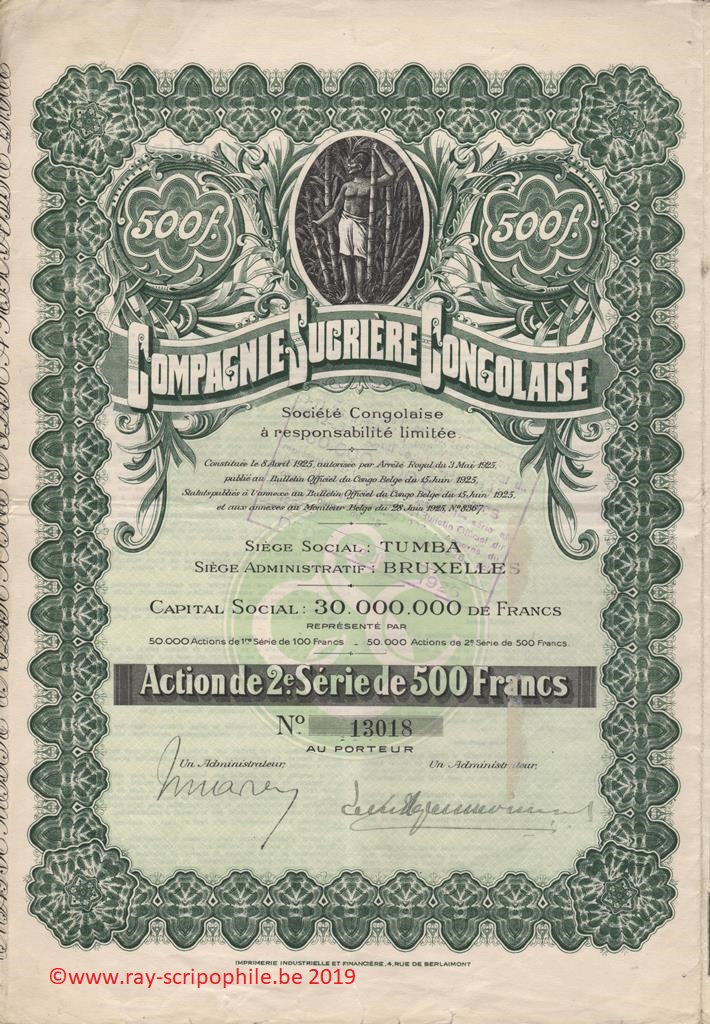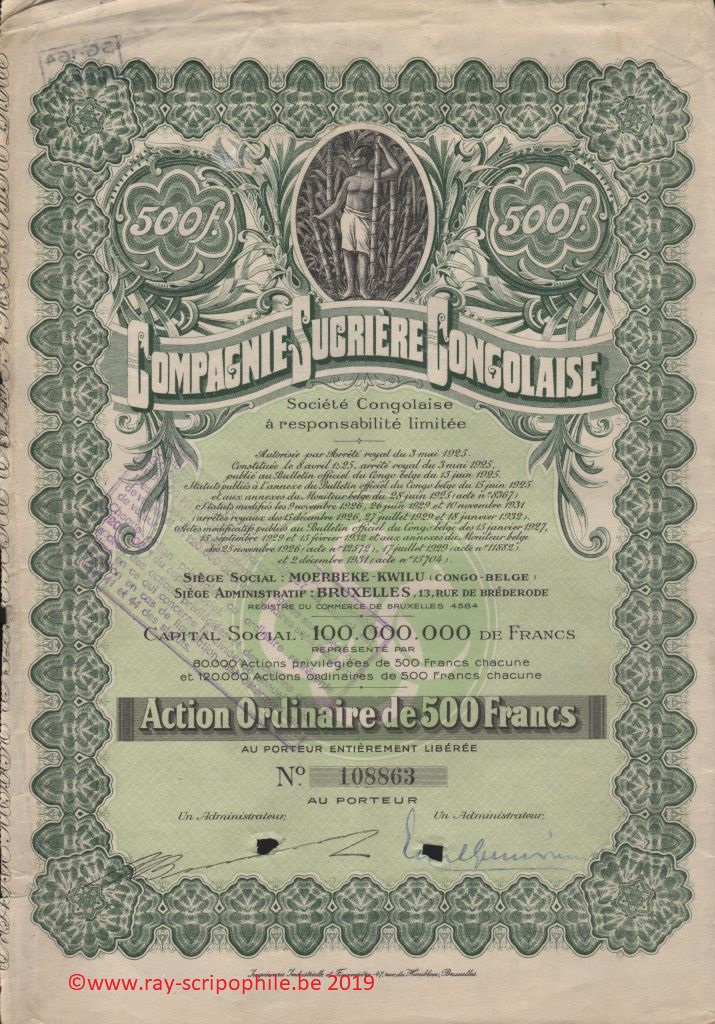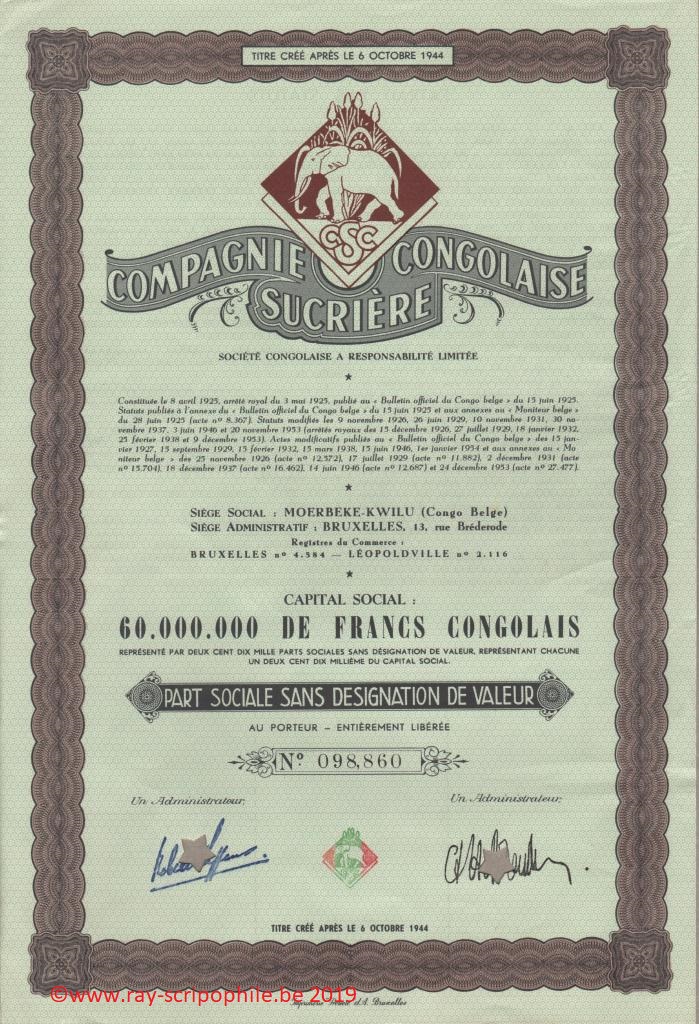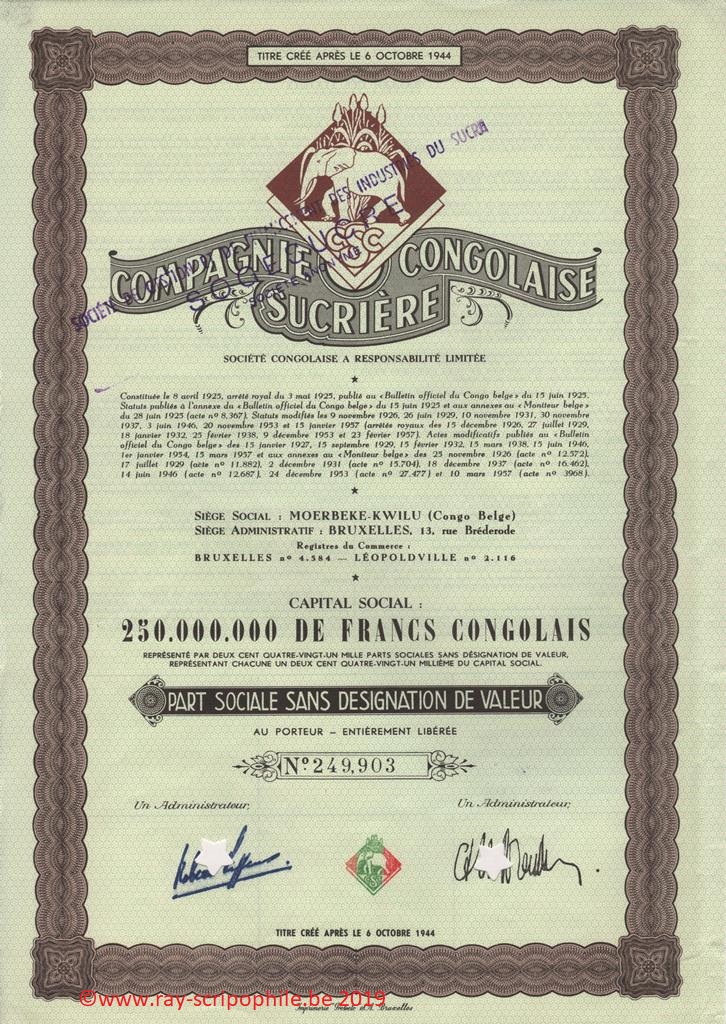COMPAGNIE SUCRIERE CONGOLAISE S.C.R.L.
Constitution
The Compagnie Sucrière Congolaise was created on April 8, 1925 with a capital of 30 million francs represented by 50,000 shares 1st series of 100 francs and 50,000 shares 2nd series of 500 francs. The registered office was established in Tumba and the administrative headquarters in Brussels.
The 50,000 1st series shares were subscribed and immediately paid up by 20% as follows:
The 50,000 2nd series shares were subscribed for and immediately paid up by 20% by:
Names La Banque d’Outremer S.A. La Compagnie de Congo pour le Commerce et l’Industrie C.C.C.I. S.A. La Société Générale de Belgique S.A. La Mutuelle Mobilière et Immobilière S.A. MM F.M. Philippson et Cie S.N.C. Henri Lambert Le Crédit Général du Congo S.A. MM Fabri et Cie S.C.S. Josse Allard La Société Coloniale Anversoise S.A. La Banque Commerciale du Congo S.A. Henri Naus La Sucrerie et Raffinerie de Moerbeke-Waes S.A. La Raffinerie Tirlemontoise S.A. La Sucrerie Frans Wittouck S.A.r | Number 11.500 6.500 6.000 5.000 4.000 2.000 2.000 1.000 500 1.000 400 5.100 2.000 2.000 1.000 |
On June 18, 1925, 30,000 fully paid-up 2nd series shares were offered for subscription at a price of 575 francs.
First Board of Directors
Object
Change(s) in capital, event(s), shareholding(s), dividend(s), quotation
On November 9, 1926, the capital was increased to 60 million francs by the creation of 50,000 first series shares of 100 francs and 50,000 second series shares of 500 francs, issued respectively at a price of 120 and 600 francs and subscribed by the Banque d'Outremer. The Banque d'Outremer offered them to shareholders for subscription, at the same price, share for share and irreducibly.
During the year 1926, the establishment works in the valley of Kwilu-Madiata continued normally, the construction of the European city was undertaken, as well as the works of connecting the railway to the factory.
At the end of 1926, 103 hectares were planted, 120 hectares were ploughed, and more than 200 hectares were cleared and cleared. The train arrived at the Kwilu farm in August 1927.
From 7 to 11 March 1927, 20,000 shares of the 2nd series were put up for sale by public subscription at a price of 1,200 francs per share (21-(1928 T1)-660-661).
During the years 1927 to 1929, the Company continued to develop the extension of crops, the construction of the factory, the development of the railway and the completion of the workers' village.
In 1929, the production of sugar of higher polarization was 820 tons (21-(1930 T1)-688).
To improve production, the Company decided on November 10, 1931, to transform the representation of capital and increase it as follows:
Conversion of 1st series shares of 100 francs into 2nd series shares of 500 francs, the exchange was made based on 5 1st series shares of 100 francs for 1 2nd series share of 500 francs. The 120,000 shares of the 2nd series became ordinary shares.
Capital increase of 40 million francs to 100 million francs through the creation of 80,000 preference shares of BEF 500 each, subscribed at par and fully paid up by Compagnie du Congo pour le Commerce et l'Industrie, with a commitment to offer them to former shareholders on a preferential basis of 2 preference shares for 3 ordinary shares (21-(1935 T1)-744).
During the early 1930s, the production of crystallized sugar increased year by year to reach a production of 8,467 tons in 1935.
1936 was a difficult year for the Company; the world crisis caused a drop in the price of sugar, which had already been felt in previous years, and hit the Company hard as it grew.
In 1937, the Company continued its recovery; the results of the 1937 crop year confirmed the effectiveness of the cultivation methods used in recent years; on November 30, the Company decided to reorganize its financial structure by reducing its capital by 40 million francs to 60 million francs through the amortization of losses and other balance sheet items. The par value of preferred and common shares was eliminated (21-(1940 T1)-309-10).
During the years of the Second World War, the Company continued to manufacture sugar and sales of sugar increased.
Starting in 1946 the Company made a new start, its area under harvest was 2,366 hectares compared to 2,290 in 1940, its sales were 8,261 tons for the Belgian Congo compared to 2,152 in 1940.
On November 17, 1947, the Company paid the dividends for the fiscal years (21-(1946-47 T6)-2740 to 2743):
Exercices Act priv brut Act ord brut | 1940 30 30 | 1941 30 30 | 1942 30 30 | 1943 40 40 | 1944 45 45 | 1945 45 45 | 1946 60 60 |
The Company ended the 1940s with an increase in production and sales, which allowed it to make profits and distribute dividends:
Exercices Act priv brut Act ord brut | 1947 60 60 | 1948 70 70 | 1949 70 70 (1) |
(1)Coupon of New titles
From March 27 to September 30, 1950, the Company proceeded, pursuant to the law of January 17, 1949, to the exchange of Preferred shares for common shares (21-(1950 T4)-3250 to 3252).
On November 20, 1953, the EGM decided that the francs forming the capital of the Company were Congolese francs. On the same day, it modified the representation of the capital by transforming the 84,000 preferred shares and the 126,000 ordinary shares into 210,000 shares with no par value. The exchange took place based on one new share for one preferred share or one ordinary share and this as from April 1, 1954. The capital was then 60 million Congolese francs (21-(1955 T4)-3746 to 3749).
On January 15, 1957, the capital was increased from 60 million to 150,600,000 francs, without the creation of new shares, by capitalizing reserves and capital gains on fixed assets. Then the capital was increased to 250 million francs by the creation of 71,000 shares issued at a price of 1,400 francs and subscribed by the Compagnie du Congo pour le Commerce et l'Industrie, which offered them for sale at the same price plus 90 francs for expenses, up to 70,000 shares to the owners of old shares, irreducible in the proportion of 1 new share for 3 old shares, and in addition, reducible for shares not absorbed; the remaining 1,000 shares were reserved for members of the Company's staff.
During the 1950s, the Company continued to grow and since 1957, the capital increase has provided nearly 100 million francs for the establishment of new facilities capable of absorbing ever-increasing production.
At the end of 1960, the area under harvest was 3460 hectares against 2759 in 1950, the total production of white granulated sugar was 25,933 tons against 12913 in 1950 (21-(1960 T3)-3029 to 3032).
Dividends paid between 1950 and 1960
(1) Net coupon in FB of the new shares
Exercices Act priv brut Act ord brut | 1950 70 70 | 1951 75 75 | 1952 85 85 | 1953 (1) 80 | 1954 (1) 85 | 1955 (1) 85 | 1956 (1) 90 | 1957 (1) 90 | 1958 (1) 90 | 1959 / 0 | 1960 / 0 |
Following the independence of the Congo, the Company opted for Belgian legal status pursuant to the law of June 17, 1960. As a result, it was subject to Belgian law and its registered office was established in Brussels. On December 22, 1961, it contributed its assets located in the Congo to Compagnie Sucrière du Congo, a Congolese company with a capital of 1,200 million Congolese francs and represented by 502,000 shares without designation of value.
The new object of the Belgian Company was:
The manufacture and refining of sugar in Africa and particularly in Congo, the cultivation of cane, as well as all other plants used for the manufacture of sugar, the manufacture of all by-products, the exploitation, trade, transformation of all agricultural products and by-products or used in sugar refineries (21-(1965 T3)-1864).
In 1963, the Company changed its corporate name to Société de Gestion et de Financement des Industries du Sucre "SOGESUCRE".
After the Zaireanization of 1973, the Congolese Society was nationalized and transferred to the National Sugar Office. It was not until 1976 that it was returned with the obligation to transfer 40% of the shares to Zairian partners (2-(1977-141).
In 1977, the capital of SOGESUCRE was reduced to 235,950,000 francs and a reimbursement of 50 francs was distributed to each share in 1978 (2-(1978-136).
Public Purchase Offer
From May 20 to June 6, 1986, Finasucre made a Public Purchase Offer on the 40,091 shares with coupon 48 attached still in circulation at a price of 940 francs; on September 30 of the same year SOGESUCRE will be delisted from the quotation on the Brussels Stock Exchange (2-(1987-222).
Tables of prices in fb and figures of the sugar exploitation of the Compagnie Sucrière Congolaise:
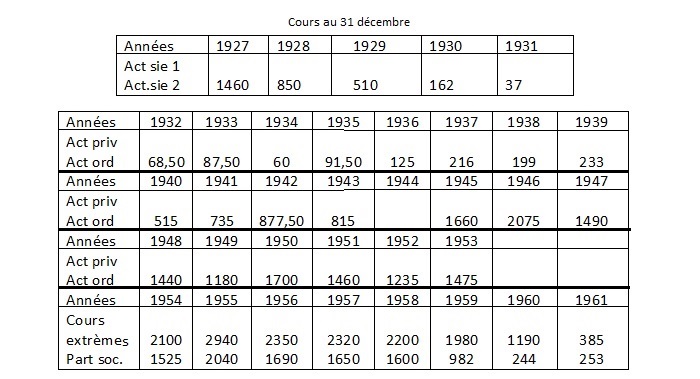 |
Years 1936 1937 1938 1940 1941 1942 1943 1944 1945 1946 1947 1948 1949 1950 1951 1952 1953 1954 1955 1956 1957 1958 1959 1960 | Area subject to harvest 2.211 hectares 2.238 hectares 2.290 hectares 2.590 hectares 2600 hectares 2600 hectares 2680 hectares 2620 hectares 2414 hectares 2366 hectares 2567 hectares 2685 hectares 2816 hectares 2759 hectares 2785 hectares 2896 hectares 2785 hectares 2919 hectares 2928 hectares 3011 hectares 3226 hectares 3466 hectares 3574 hectares 3460 hectares | Total production of granulated sugar 9175 tonnes 13304 tonnes 14217 tonnes 15988 tonnes 11897 tonnes 16226 tonnes 13808 tonnes 12308 tonnes 13228 tonnes 13288 tonnes 15610 tonnes 15733 tonnes 12602 tonnes 12913 tonnes 14150 tonnes 15283 tonnes 16433 tonnes 15894 tonnes 15790 tonnes 17332 tonnes 19322 tonnes 17678 tonnes 26621 tonnes 25933 tonnes |


